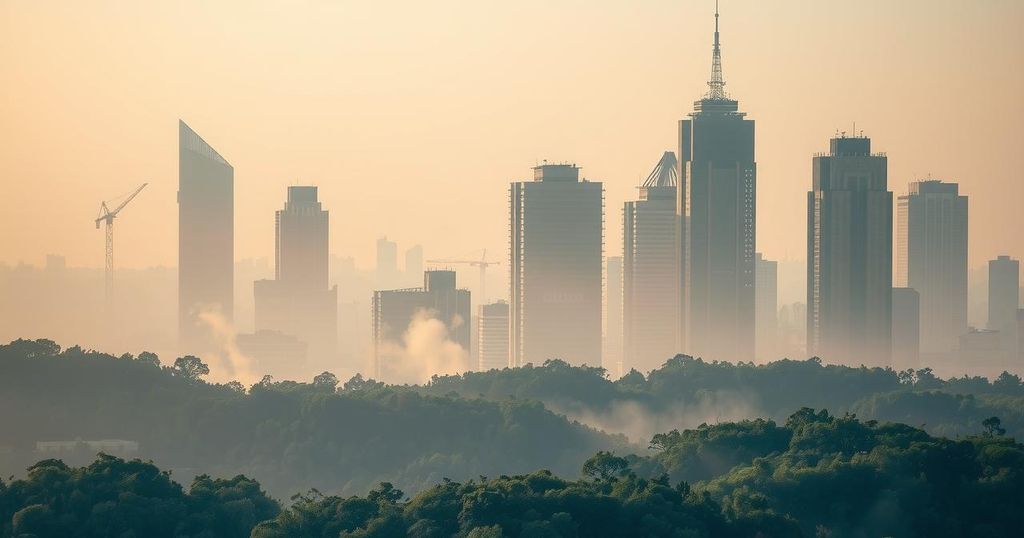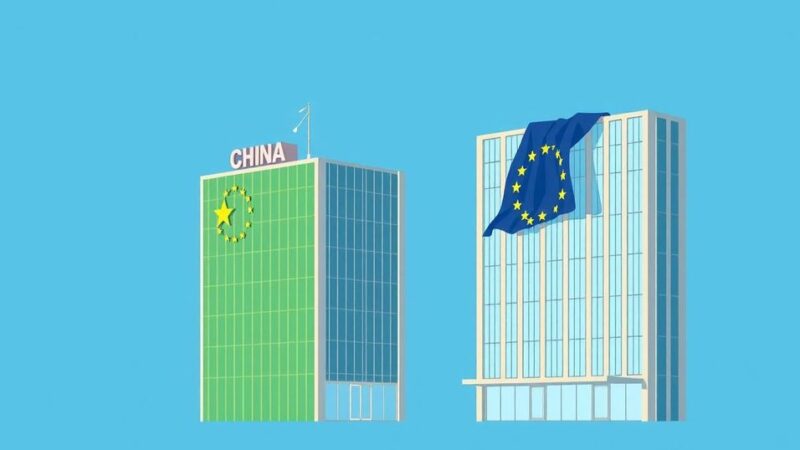The 2024 World Air Quality Report has identified Ghana, Nigeria, Chad, and Rwanda among the most polluted countries, with Chad having a PM2.5 concentration nearly 18 times WHO guidelines. The rising pollution levels pose significant health risks and underline a growing public health crisis in Africa. Experts call for immediate action to address air quality issues, particularly in Ghana, where pollution levels have sharply increased over recent years.
A recent report from the 2024 World Air Quality assessment indicates alarming air pollution levels in Africa, identifying Ghana, Nigeria, Chad, and Rwanda among the most affected countries. This highlights a significant air quality crisis that poses serious health risks to millions of people across the continent.
Chad ranks highest globally with a concerning PM2.5 concentration of 91.8 µg/m³, a staggering 18 times above the World Health Organization’s (WHO) annual limit of 5 µg/m³. Other nations, including Nigeria (11th, 40.1 µg/m³), Rwanda (9th, 40.8 µg/m³), and Ghana (14th, 35.8 µg/m³), also reported high pollution levels. PM2.5 pollutants are especially dangerous as they penetrate deep into the lungs, leading to severe health problems such as respiratory disease.
According to the University of Chicago’s Air Quality Life Index, pollution in heavily populated areas decreases life expectancy by an average of 2.7 years. In Ghana alone, WHO data estimates around 28,000 deaths annually due to pollution, with global figures around 8.1 million caused by air pollution in 2021, underscoring the urgent need for action against this health crisis.
Air pollution in Ghana has surged alarmingly, now reported at seven times higher than the WHO limit. Accra, Ghana’s capital, ranked 16th among polluted cities with a PM2.5 level of 36.3 µg/m³, with Kumasi surpassing it at 39.5 µg/m³ for the first time in the report. Ghana’s pollution ranks have worsened from 27th in 2022 to 14th in 2024, indicating a growing public health crisis.
The data reveals significant pollution challenges across Africa, where five of the world’s ten most polluted countries are found. Air quality monitoring in the region is severely lacking, with only 24 out of 54 countries reporting data. As a consequence, many cities experience PM2.5 levels much higher than the WHO guidelines.
The pollution crisis in Ghana is not purely an environmental problem but a public health emergency, leading to frequent fatalities. Current trends suggest that if left unchecked, the country could experience over 2,333 air pollution-related deaths monthly. Consequently, experts warn of an impending economic cost of $137.8 billion by 2040 if reforms are not made.
Globally, the data highlights that only 17% of cities meet WHO air quality guidelines. Comparatively, only a few countries maintain clean air, including Australia and New Zealand. In Africa, Nieuwoudtville in South Africa is the only city that meets WHO standards.
Driving factors behind Africa’s pollution include rapid urbanization, population growth, industrial emissions, and unchecked waste incineration. Particularly in Kinshasa, PM2.5 levels increased significantly due to rising industrial activity. Meanwhile, NGOs now provide a majority of air quality data in Africa, revealing an urgent need for improved government monitoring.
As pollution levels grow, there is increasing pressure on Ghanaian authorities to adopt stringent environmental measures. Suggestions include enhanced vehicle emissions regulations, investment in renewable energy, expanded air quality monitoring, and strict anti-burning policies to mitigate pollution impacts. Without immediate measures, the air quality crisis in Ghana and across Africa is likely to escalate further, threatening public health and economic stability.
The 2024 World Air Quality Report reveals a dire air pollution crisis in Africa, particularly highlighting Ghana, Nigeria, Chad, and Rwanda. With alarming PM2.5 concentrations significantly exceeding WHO guidelines, the health implications are severe, leading to thousands of deaths annually. Urgent actions are necessary to enforce stricter regulations and improve air quality monitoring to mitigate this escalating public health crisis.
Original Source: www.myjoyonline.com






